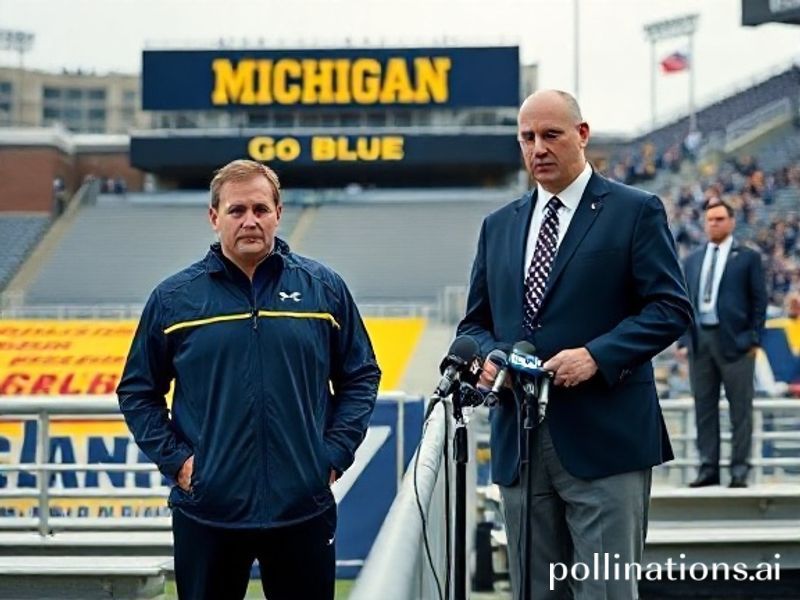Michigan Coach Suspension: How a Midwestern Football Scandal Became the World’s Favorite New Reality Show
When the University of Michigan announced the “indefinite suspension” of its head football coach, Jim Harbaugh, the initial reaction in Ann Arbor was predictable: grown men in maize-and-blue jerseys weeping into their overpriced IPAs. Yet halfway around the world, the tremor registered differently. In Singapore, traders at the Marina Bay futures desk briefly paused their Bloomberg terminals; in Lagos, a sports-radio host used the incident to segue into a rant about Nigerian visa delays; and in Geneva, an IOC delegate sighed, “Great, another American compliance saga—popcorn?”
What looks, on the surface, like a quaint Midwestern morality play—sign-stealing, burner phones, a low-level staffer nicknamed “The Raven” (apparently because every scandal now needs its own comic-book villain)—is actually a neat parable for our age of globalized hypocrisy. Michigan’s football program prints money the way the U.S. Treasury used to before Congress discovered debt ceilings; last year the athletic department’s revenue surpassed the GDP of Kiribati. So when the NCAA pokes around, it’s not enforcing rules so much as renegotiating the imperial tribute. The rest of the planet, long accustomed to watching America monetize its own rule-breaking, nods knowingly. After all, FIFA just awarded the next World Cup to a country that still uses medieval labor laws, but sure, tell us again how impermissible scouting is the existential threat to amateurism.
Europeans, who have spent decades perfecting the art of the football transfer ban, find the whole spectacle charmingly naïve. “You gave the man three games?” chortled a La Liga compliance officer over vermouth in Madrid. “We’d have torched the trophy cabinet.” Meanwhile, Chinese Super League clubs—fresh from their own government-mandated salary-cap haircuts—view the suspension as proof that American universities are merely catching up to the Communist Party’s talent for self-sabotage. And in Brazil, where match-fixing investigations sometimes involve actual firearms, the Michigan episode trended under the hashtag #FutebolDeGringosAdoravel.
The broader significance lies not in the stolen signals but in the signals we keep broadcasting about ourselves. We export Marvel movies, McDonald’s, and moral outrage in equal measure, then act surprised when the world binge-watches our hypocrisies. The same algorithms that turn a sideline drone into a geopolitical subplot also ensure that a Michigan loss on Saturday reverberates through offshore betting markets by Sunday. Every expatriate bar from Bangkok to Bucharest now hangs a Wolverines flag next to the Premier League scarves, not out of fandom but because American college football has become a reliable proxy for U.S. cultural volatility—like the VIX index with marching bands.
And then there is the meta-narrative of Harbaugh himself: khaki-clad throwback, milk-guzzling eccentric, occasional Trump donor, occasional social-justice tweeter—an ideological chimera perfectly calibrated for the attention economy. Suspending him is less punishment than content generation; the university collects the moral high ground while keeping the merch machine humming. It’s the same sleight-of-hand multinationals deploy when they tweet solidarity with whichever cause is trending from their Cayman Islands headquarters.
International observers have seen this movie before, subtitled in a dozen languages. We preach transparency while our data brokers sell voter profiles to the highest bidder. We sermonize about fair play while our private-equity titans strip-mine foreign pension funds. And now we clutch pearls because someone may have watched an opponent’s practice through binoculars—binoculars that were probably manufactured in the same province where the NBA sources its basketballs, incidentally.
So, as Ann Arbor braces for a postseason without its field-general-slash-culture-war totem, the planet shrugs in unison. Another empire caught cheating at its own board game, another round of performative penance, another reminder that the rules are written in disappearing ink. The only truly universal constant, from the maize-crusted Big House to the smoggy skyline of Shenzhen, is that the house always wins—especially when the house has its own television network.







